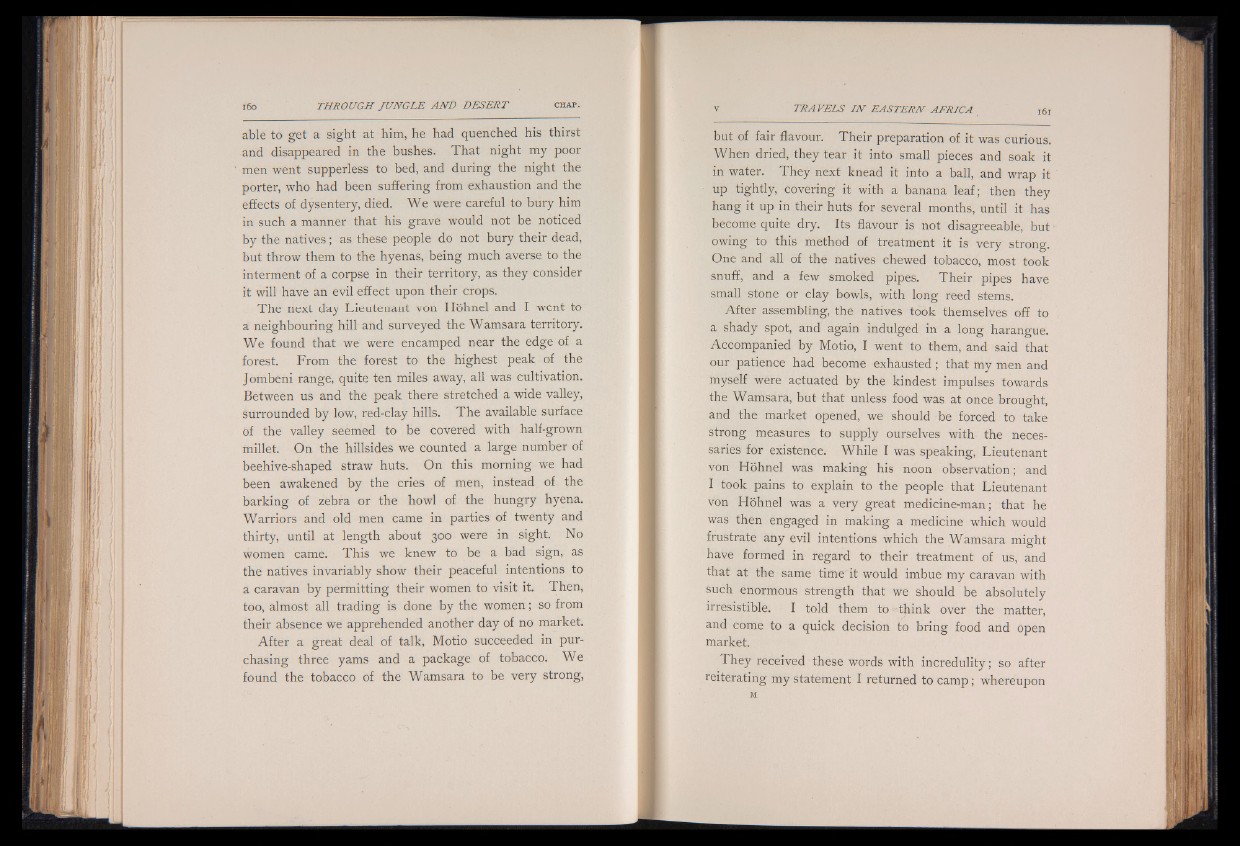
able to get a sight at him, he had quenched his thirst
and disappeared in the bushes. That night my poor
men went supperless to bed, and during the night the
porter, who had been suffering from exhaustion and the
effects of dysentery, died. We were careful to bury him
in such a manner that his grave would not be noticed
by the natives; as these people do not bury their dead,
but throw them to the hyenas, being much averse to the
interment of a corpse in their territory, as they consider
it will have an evil effect upon their crops.
The next day Lieutenant von Hohnel and I went to
a neighbouring hill and surveyed the Wamsara territory.
We found that we were encamped near the edge of a
forest. From the forest to the highest peak of the
Jombeni range, quite ten miles away, all was cultivation.
Between us and the peak there stretched a wide valley,
surrounded by low, red-clay hills. The available surface
of the valley seemed to be covered with half-grown
millet. On the hillsides we counted a large number of
beehive-shaped straw huts. On this morning we had
been awakened by the cries of men, instead of the
barking of zebra or the howl of the hungry hyena.
Warriors and old men came in parties of twenty and
thirty, until at length about 300 were in sight. No
women came. This we knew to be a bad sign, as
the natives invariably show their peaceful intentions to
a caravan by permitting their women to visit it. Then,
too, almost all trading is done by the women; so from
their absence we apprehended another day of no market.
After a great deal of talk, Motio succeeded in purchasing
three yams and a package of tobacco. We
found the tobacco of the Wamsara to be very strong,
but of fair flavour. Their preparation of it was curious.
When dried, they tear it into small pieces and soak it
in water. They next knead it into a ball, and wrap it
up tightly, covering it with a banana leaf; then they
hang it up in their huts for several months, until it has
become quite dry. Its flavour is not disagreeable, but
owing to this method of treatment it is very strong.
One and all of the natives chewed tobacco, most took
snuff, and a few smoked pipes. Their pipes have
small stone or clay bowls, with long reed stems.
After assembling, the natives took themselves off to
a shady spot, and again indulged in a long harangue.
Accompanied by Motio, I went to them, and said that
our patience had become exhausted; that my men and
myself were actuated by the kindest impulses towards
the Wamsara, but that unless food was at once brought,
and the market opened, we should be forced to take
strong measures to supply ourselves with the necessaries
for existence. While I was speaking, Lieutenant
von Hohnel was making his noon observation; and
I took pains to explain to the people that Lieutenant
von Hohnel was a very great medicine-man; that he
was then engaged in making a medicine which would
frustrate any evil intentions which the Wamsara might
have formed in regard to their treatment of us, and
that at the same time it would imbue my caravan with
such enormous strength that we should be absolutely
irresistible. I told them to think over the matter,
and come to a quick decision to bring food and open
market.
They received these words with incredulity; so after
reiterating my statement I returned to camp; whereupon
M